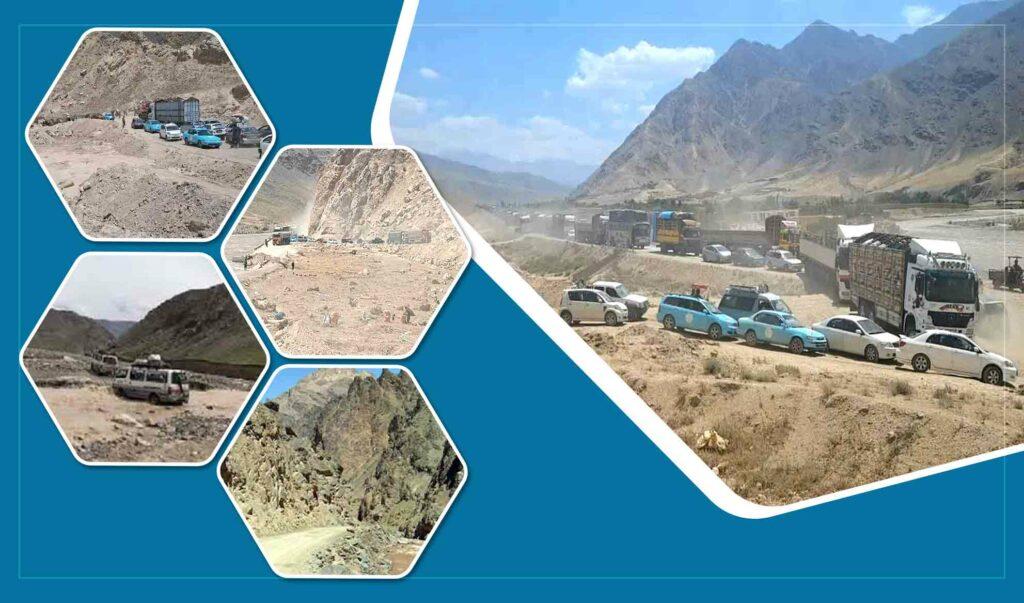PUL-I-KHUMRI (Pajhwok): Residents of seven districts in northeastern Baghlan province say roads connecting their districts with the provincial capital, Pul-i-Khumri city, are in bad condition and sometimes emergency patients die on the way to hospital.
Roads connecting Tala wa Barfak, Dehna Ghori, Farang, Khost, Jalgai, Guzargah Noor and Pul-i-Hisar districts have been damaged due to heavy rains and floods and have not been repaired.
A tribal elder from Khost district, Aminullah, told Pajhwok Afghan News that the main problem of the residents of Khost, Guzargah Noor, Farang and Jalgai districts was dilapidated roads and as a result, about 300,000 people living in these districts were facing numerous problems.
“The road from Khost district to Nahrin district is not long, but it takes us six hours to reach Nahrin due to the bad condition of the road. No equipped hospitals exist in Khost and surrounding districts. We are forced to take our patients to Nahrin. Emergency patients, such as pregnant women, die on this bad road before reaching hospital.”
Similarly, Arbab Abdul Mohammad, a resident of Pul-i-Hisar district, said that their road up to Deh Salah district has been built, but beyond it was in bad condition, causing delays in commute time to Pul-i-Khumri city for hours.
“Pul Hisar borders Panjshir province. The Khawak road which is the best alternative to the Salang route is closed for seven months every winter due to its poor condition. We are located closer to Panjshir than Pul-i-Khumri. If this road is repaired, it will be a good alternative to the Salang route, and we will easily transfer our patients to hospitals in Panjshir province.”
Abdul Ahmad, a resident of Deha Ghori district, also said that roads leading to Pul-i-Khumri city have been in a rundown condition for a long time, which he called a big headache for them.
“Our roads are in very bad condition. Water from Shalikta and Charma rivers inundate the roads during floods and rains. An emergency patient often dies on the way before reaching the doctor.”
Meanwhile, officials from the Baghlan Public Works Department also acknowledge the problems faced by residents of remote districts due to deteriorated highways and roads.
However, they said they had worked within their ability to repair some roads, but their basic reconstruction required a high cost that the government could not afford at the moment.
Bahir Shinwari, finance and administrative officer at the department, told Pajhwok: “Road reconstruction project in Tala wa Barfak district, which was started with financial support of the World Bank, is awaiting the bank’s resumption of activity in Afghanistan”.
He said their ministry had sent a letter to survey roads in Khost and other districts. “The road ends in a valley, but the problem is that an alternative location must be selected for its basic reconstruction; because residential houses will be destroyed and if it is not built in a basic form, it will not yield results.”
He added that so far there was no plan to build a road between Pul-i-Hisar and Panjshir, but a letter from the ministry has been received to build roads in Deha -Ghori and Jalgai districts, and the provincial administration was also trying to start work on it.
The remaining ten districts of Baghlan, except for Khunjan, Doshi, Nahrin, Markazi Baghlan and Dand-Ghori districts, are located in mountainous areas and roads built in some of them have also been destroyed due to seasonal floods.
ma







GET IN TOUCH
NEWSLETTER
SUGGEST A STORY
PAJHWOK MOBILE APP